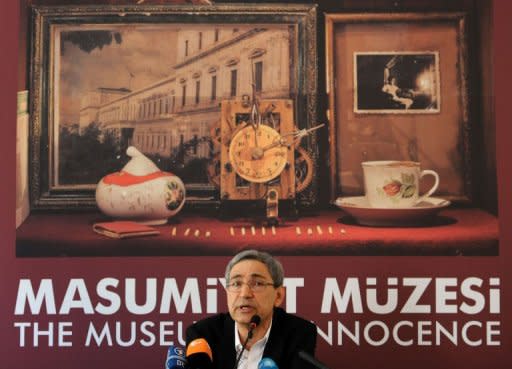Nobel laureate Pamuk opens physical 'Museum of Innocence'
Turkish Nobel laureate Orhan Pamuk on Friday inaugurated a museum based on his last book about an obsessive lover who collects things to remind him of his inamorata and soothe the pain of a doomed affair. Pamuk said his 2008 oeuvre "The Museum of Innocence," which took several years to write, came about while he was "collecting the objects that I described in the book." The story, which takes place in Istanbul between 1975 and the present, centres around wealthy businessman Kemal Bey, who harbours a 30-year passion for the impoverished Fusun, a distant cousin and shop assistant, who becomes his mistress. Kemal does not renounce his fiancee Sibel, who breaks off their engagement after learning about Fusun, who herself disappears one day. Shunned by Istanbul's moneyed bourgeoisie, Kemal becomes an avid collector to satisfy his emotional obsession with his object of desire. He rediscovers Fusun after almost a year -- now married to a fat, amiable man from her old working-class neighbourhood -- and invites himself to dinner 1,593 times over the next eight years. It is sheer torture, but at least he gets to see Fusun, who now treats him as a respected elder relative. The 59-year-old Pamuk said his museum in the working-class district of Cukurcuma on the Bosphorus river was aimed at re-igniting the sentiments one felt while reading the book and not an "illustration" of it. "The novel is not an explanation of the museum. They are deeply intertwined," he told a news conference. "We remember the sentiment, the drama, the effects the text generates in us -- not the text, the feelings the text generates in us," he said. "The objective was to generate a feeling very similar to what the book develops." The museum has 23 display cases -- each representing a chapter of the book. The objects range from an earring that Fusun lost to a summer dress, and the display cases end up depicting the bedroom where Kemal recounts his love story to the narrator. The 2006 winner of the Nobel literature prize said the museum also aimed at reinforcing the fact that the daily lives of ordinary people are as "honourable" as those of kings and great generals, and their "objects should be preserved."



